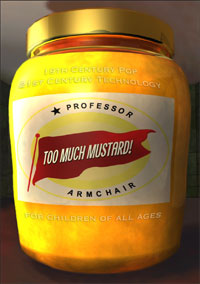|
I learned to play arrangements of country and delta blues, ragtime and other early 20th century music on guitar as a beginner. These were contractions of the originals. Notes deeper and higher than what a guitar could sound were squeezed into a narrower range and some complexities had to be removed altogether. The arrangements on Too Much Mustard are quite different. If anything they are expansions in many senses of the word. The harmonic overtones shimmer, dance and bass-lines crab and growl in ways impossible with non-digital instruments. These may be late 19th/early 20th century popular tunes, but they use distinctly 21st century instruments. These arrangements were literally painted using special software, not performed. In many ways they are 21st century equivalents of early 20th century player pianos. In many ways Professor Armchair straddles the centuries.
This music at its best evokes happiness of a by-gone era. Circuses and carousels and calliopes, oh my! To some they may appear to be pandering, even
 kitsch. But the truth is they reflect the optimism, the innocence and the fun-loving of our great grandparents. They saw the future as a time for opportunity, for hope, for joy. And what could be bad in that? Few could imagine the horrors of two world wars nor fewer still the attacks of the 21st century.
kitsch. But the truth is they reflect the optimism, the innocence and the fun-loving of our great grandparents. They saw the future as a time for opportunity, for hope, for joy. And what could be bad in that? Few could imagine the horrors of two world wars nor fewer still the attacks of the 21st century.
Many of the titles are obscure, yet some achingly familiar. Where have we heard Me-ow before? In grainy old black and white cartoons of mewling
alley cats, most likely, but I've been unable to find such a cartoon in my modest collection (and I have copies of all the Betty Boop cartoons).
Is this music whose time has come and gone? Ragtime's popularity has never completely disappeared. And nearly everyone will associate Funeral March of a Marionette with a certain film director with a highly characteristic, bulbous profile.
Other figures of public notoriety associated themselves with these songs. The title tune "Tres Moutarde" (Too Much Mustard) was the theme song of early pilot Lincoln Beachey. Beachey hired bands to play it as he looped the loop in his small stunt airplane before paying crowds of amazed onlookers. He felt the song's title Too Much Mustard suited his personality to a "T." He was just a little too much. The arrangements in this collection are perhaps just a bit too much mustard themselves.
Is this music suitable only for children? As they say in the circus: this is music for "children of all ages."
If you look behind the curtain, you'll find that Professor Armchair is none other than Magnatue artist Glen Bledsoe.
| 
![[Magnatune : we are not evil]](http://he3.magnatune.com/images/m3/inside_magnatune_logo.gif)
![[Free trial: only $15 per month]](http://he3.magnatune.com/images/m3/inside_mascot.gif)
![[login]](http://he3.magnatune.com/images/m3/login_btn.gif)
![[info]](http://he3.magnatune.com/images/m3/info_btn.gif)












![[Magnatune : we are not evil]](http://he3.magnatune.com/images/m3/inside_magnatune_logo.gif)
![[Free trial: only $15 per month]](http://he3.magnatune.com/images/m3/inside_mascot.gif)
![[login]](http://he3.magnatune.com/images/m3/login_btn.gif)
![[info]](http://he3.magnatune.com/images/m3/info_btn.gif)










